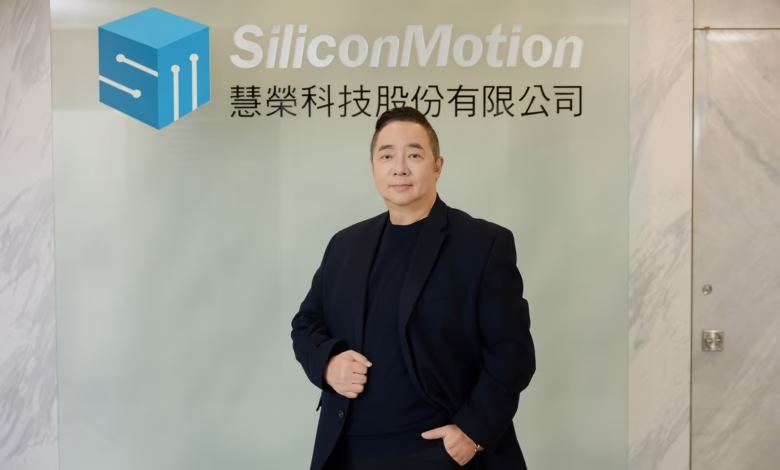PCIe 6.0 SSDs Won’t Hit PCs Until 2030, Says SMI CEO

▼ Summary
– The SSD controller market has consolidated, leaving only a few independent makers like Silicon Motion (SMI), which are thriving due to strong industry demand.
– SMI’s growth strategy focuses on aligning its roadmap with market trends and NAND makers’ needs, leveraging its expertise in controllers for diverse applications like client, enterprise, and automotive SSDs.
– The company expects rapid growth in enterprise and automotive segments, aiming for 40% market share in client SSDs within three years, driven by PCIe 5.0 adoption.
– SMI is developing PCIe 6.0 controllers for enterprise use, targeting late 2026, while consumer-grade PCIe 6.0 SSDs are not expected until 2030 due to limited OEM interest.
– SMI plans to diversify manufacturing by using Samsung Foundry for cost reduction, while maintaining its core IP in-house and focusing on organic R&D growth over acquisitions.
The storage industry has undergone significant consolidation over the past decade, leaving only a handful of independent SSD controller manufacturers standing. Among them, Silicon Motion (SMI) has emerged as a key player, thriving alongside competitors like Maxio and Phison. In a recent discussion with SMI CEO Wallace C. Kou, insights were shared about the company’s strategy, market trends, and the future of storage technology.
One of the most striking revelations was the timeline for PCIe 6.0 SSDs. While enterprise-grade solutions are expected to arrive by late 2026 or 2027, consumer versions won’t hit the market until around 2030. The delay stems from a lack of immediate interest from PC OEMs and chipmakers like Intel and AMD, who are still focused on optimizing PCIe 5.0 adoption. Kou emphasized that SMI is well-positioned to dominate the PCIe 5.0 market for the next several years, with projections of capturing up to 60% market share in high-end controllers.
The conversation also touched on the challenges of developing next-gen controllers. Advanced nodes like 4nm significantly increase costs, with tape-outs alone reaching $30–40 million. This financial barrier makes it difficult for new entrants to compete, further solidifying SMI’s position as a leader in enterprise and high-performance storage solutions. The company is already working on PCIe 6.0 controllers, targeting alignment with Nvidia’s Rubin platform for compute storage applications.
Another key topic was the shifting dynamics in the SSD market. Kou highlighted how module makers are gaining traction in the PC OEM space, particularly in value and mainstream segments. Brands like Kingston, Adata, and Longsys are increasingly supplying SSDs to major manufacturers such as Dell, HP, and Lenovo. This shift is driven by cost competitiveness, with Chinese module makers operating on thinner margins compared to NAND manufacturers.
AI and hyperscale storage demand were also focal points. Kou noted that companies like Meta, Google, and Microsoft are pushing for higher-density QLC SSDs, aiming for 128TB drives to support AI workloads. Nearline SSDs are expected to gradually replace HDDs and even tape storage in certain applications, signaling strong growth in enterprise storage over the next five years.
On the topic of manufacturing, SMI is diversifying its foundry partnerships. While TSMC remains the primary supplier, Samsung Foundry is being leveraged for cost-sensitive projects. The company is exploring process nodes like Samsung’s 8nm and 5nm to balance performance and affordability, particularly for PCIe 4.0 and 5.0 controllers.
Looking ahead, SMI is expanding beyond traditional storage. Automotive and enterprise segments are poised for rapid growth, with automotive solutions already accounting for 5% of revenue. The company is also exploring connectivity technologies to reduce latency in AI systems, though Kou ruled out developing retimers or compute storage solutions in-house.
Despite geopolitical and economic uncertainties, SMI remains confident in its growth trajectory. With a strong design-in pipeline and increasing market share across client, enterprise, and mobile storage, the company anticipates reaching $1 billion in revenue by the end of the year. While tariffs and supply chain risks persist, Kou believes the storage industry’s capacity-driven demand will outweigh these challenges.
The interview concluded with reflections on SMI’s acquisition strategy. Kou emphasized organic R&D growth over large-scale mergers, citing past lessons from acquisitions like Shannon Systems. Moving forward, the company will focus on strengthening its IP portfolio, particularly in PCIe and UFS technologies, while cautiously evaluating smaller, strategic acquisitions in Taiwan.
As the storage landscape evolves, SMI’s adaptability and focus on high-growth segments position it as a critical player in shaping the future of data storage. With PCIe 6.0 on the horizon and AI driving unprecedented demand, the company’s roadmap reflects a clear vision for sustained leadership in the industry.
(Source: Tom’s Hardware)